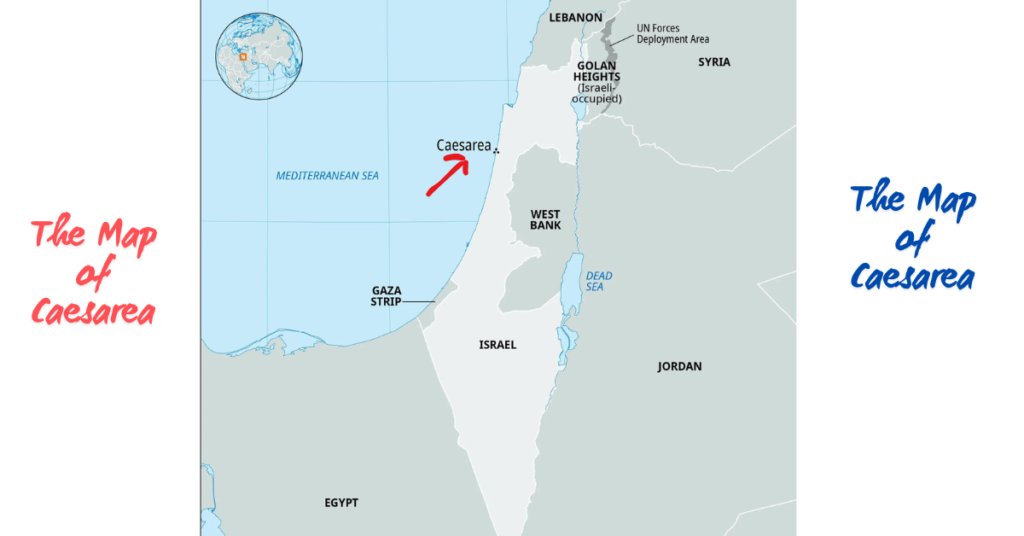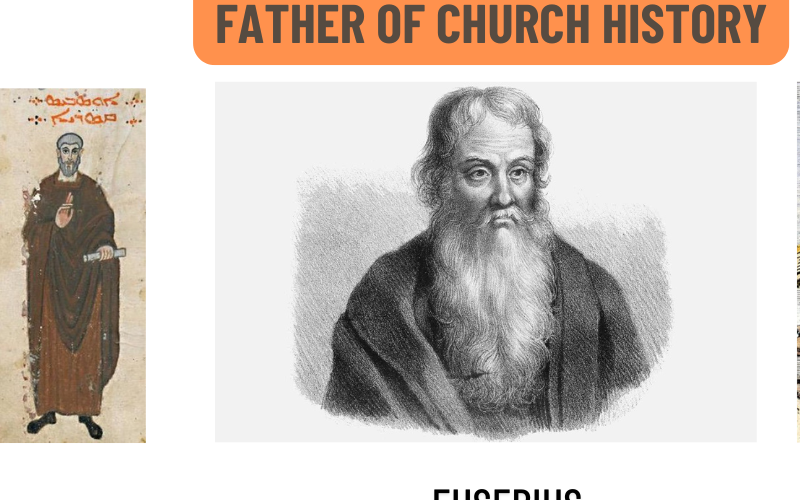Eusebius of Caesarea
Caesarea is an ancient city located on the coast of modern-day Israel, approximately midway between Tel Aviv and Haifa, along the Mediterranean coast. It is often referred to as Caesarea Palaestinae or Caesarea Maritima.

Eusebius Early Life and Background
Eusebius of Caesarea was born around AD 260 in the city of Caesarea Maritima, located in the province of Roman Palestine. At the time of his birth, Caesarea was under Roman rule, and the emperor was Gallienus (ruled AD 253–268), one of the rulers during the Crisis of the Third Century, a period of instability and military chaos within the empire. Caesarea, a key intellectual and theological hub in the East, was home to a significant Christian community.

Eusebius of Caesarea is widely regarded as one of the most significant figures in early Christian history. Known for his scholarly works and his close association with Emperor Constantine, Eusebius’s contributions laid the foundation for how the history of the early Church is understood today.
Eusebius became bishop of Caesarea during a time when Christianity was still a minority religion within the Roman Empire. As a scholar, he immersed himself in the study of scripture, philosophy, and history, gathering vast amounts of knowledge from the library of Caesarea, which had been founded by his mentor, Pamphilus. Pamphilus’s influence on Eusebius was significant, as it inspired his lifelong dedication to preserving Christian writings and history.
Eusebius witnessed the arrest, torture, and execution of many Christians, including Pamphilus. He survived the persecution, possibly because of his connections or his role as a scholar rather than a church leader at that time. Eusebius wrote The Martyrs of Palestine, a vivid account of the persecution in his region, documenting the suffering and steadfastness of the Christian martyrs.
Pamphilius
Pamphilus, often referred to as Pamphilus the Martyr, was a Christian presbyter and scholar born in Beirut (then Berytus) in the Roman province of Phoenicia (modern-day Lebanon), likely around the mid-3rd century AD. He studied in Alexandria, Egypt, where he was influenced by Origen, one of the greatest Christian theologians of the early Church.
He later moved to Caesarea Maritima, where he became a leading figure in the Christian community.
Pamphilus was ordained as a priest in Caesarea, where he founded an influential school and library, following the tradition of earlier Christian scholars like Origen. His library in Caesarea became one of the most important repositories of Christian literature during the early centuries of the Church.
The Library of Caesarea, which Pamphilus helped develop, housed thousands of manuscripts, including important biblical texts, early Christian writings, and works of Origen. This library served as a vital resource for Christian scholars and theologians for generations.

Martyrdom (AD 309)
Pamphilus lived during a time of persecution against Christians, particularly under the Roman Emperors Diocletian and Galerius, who initiated widespread anti-Christian campaigns starting in 303 AD. This persecution targeted Christian leaders, scriptures, and buildings, aiming to eliminate Christianity from the Roman Empire.
In 307, Pamphilus was arrested in Caesarea for refusing to renounce his faith. He spent two years in prison, and after enduring harsh conditions and torture, he was eventually martyred in 309 AD in Caesarea along with several companions. He was executed by beheading under the orders of the Roman governor Firmilian.
Origen of Alexandria
Origen was born around 184 AD in Alexandria, Egypt, one of the leading intellectual centers of the Roman Empire. His father, Leonides, was a devout Christian, and Origen received a strong religious upbringing. Origen’s father was martyred during the persecution of Christians under Emperor Septimius Severus around 202 AD.

Around 230 AD, Origen relocated to Caesarea Maritima (in Roman Palestine), where he established his own theological school. Origen’s teaching attracted students from all over the Roman world, and he wrote extensively on theological issues, biblical interpretation, and Christian philosophy. He was deeply influenced by Platonism, which shaped many of his theological views.
Father of Church History
Eusebius earned the title “Father of Church History” for his seminal work, Ecclesiastical History. This comprehensive history traces the development of the Christian Church from its beginnings through the early 4th century. It documents key figures, events, and theological disputes, providing invaluable insight into the challenges faced by early Christians, including persecution and martyrdom.

What makes Ecclesiastical History so important is its status as one of the earliest detailed records of the Christian Church. Eusebius chronicled the lives of apostles, bishops, and martyrs, as well as heretical movements, helping to preserve the memory of the early Church’s trials and triumphs. His work became a cornerstone for later historians seeking to understand the origins and growth of Christianity.
Beyond history, Eusebius was deeply engaged in theological debates of his time. His close relationship with Emperor Constantine allowed him to play an influential role in the First Council of Nicaea (325 AD), which aimed to resolve the Arian controversy concerning the nature of Christ.
The First Council of Nicaea (325 AD)
The Council of Nicaea, the first ecumenical council in Christian history, was convened by Emperor Constantine with the purpose of addressing issues affecting the entire Christian community. The main objective of the council o meeting was to settle the dispute over Arianism, a belief that denied the divinity of Christ, asserting instead that He was a created being.

In 325 AD, to resolve this growing conflict and prevent divisions in the Roman Empire’s Christian community, Emperor Constantine called for a council of bishops. The council was held in Nicaea (modern-day İznik, Turkey), and approximately 300 bishops attended, primarily from the Eastern Roman Empire.
The primary issue was the relationship between Jesus Christ and God the Father. The council sought to clarify whether Jesus was:
- Created by God, as Arius claimed (Arianism). That’s of the same substance (homoousios) as God the Father, meaning He was co-eternal and fully divine (the Trinitarian view).
Constantine was deeply concerned about the unity of the Church, which was seen as essential for the stability of the Roman Empire. The theological divisions over Arianism were creating significant conflict among Christian leaders and communities.
So, the council rejected Arius’s teachings and declared that Christ was not a created being but was of the same substance (homoousios) as God the Father. This means that Christ was co-eternal with the Father and fully divine.
Arius and his views were condemned as heretical, and he was exiled from the Church.
The Nicene Creed:
The council produced the Nicene Creed, a formal statement of Christian faith that affirmed the Trinitarian view of God. The key phrase in the creed is that Jesus is “begotten, not made, consubstantial (of the same substance) as the Father.”
The Nicene Creed became a cornerstone of Christian orthodoxy, reaffirming the belief in the Holy Trinity: God the Father, Jesus Christ (the Son), and the Holy Spirit as three persons of the same essence.

Eusebius’s theological views were complex and sometimes controversial. Initially, he showed some sympathy towards Arianism, which argued that Christ was a created being and not co-eternal with the Father. However, after the Council of Nicaea, he endorsed the Nicene Creed and the orthodox view of the Trinity.
Life and Education of Eusebius
Eusebius was a student and later a colleague of Pamphilus of Caesarea, a devoted follower of Origen. Pamphilus played a significant role in Eusebius’s intellectual and theological development, and Eusebius honored his mentor by often being referred to as “Eusebius Pamphili” (meaning “Eusebius, friend of Pamphilus”).
Books of Eusebius
- Ecclesiastical History
- Life of Constantine
- Chronicle
- Preparation for the Gospel
- Proof of the Gospel
Eusebius’ Ecclesiastical History chronicles the early Christian Church, tracing its development from the Apostles to his time. Life of Constantine is a biography of Emperor Constantine, focusing on his conversion to Christianity and his role in shaping the Church. Chronicle outlines world history from a Christian perspective, covering key events from creation to his era. Preparation for the Gospel defends Christianity against pagan religions by demonstrating its philosophical and spiritual superiority. Proof of the Gospel presents Jesus as the fulfillment of Old Testament prophecies, aiming to prove Christianity’s truth.
Death (AD 339)
Eusebius died around AD 339, during the reign of Constantine’s sons, Constantius II and Constantine II. His influence continued through his writings and the institutional structures he helped shape in the early Christian Church. His life was marked by significant theological, historical, and political contributions that laid the groundwork for the close relationship between Christianity and the Roman state that would define the Byzantine Empire.
Legacy and Impact
Eusebius’s impact extends far beyond his lifetime. His historical and theological works set the stage for later Church historians and theologians. His blending of historical narrative with theological insight created a template for future Christian writers. Eusebius is best remembered for his pioneering role as a historian and his close connection to the first Christian emperor. His portrayal of Constantine in the Life of Constantine helped shape the emperor’s legacy as a saintly figure in the eyes of later Christian generations. Moreover, his role in promoting and defending Nicene Christianity during a critical period of doctrinal formation ensured that his influence on Church doctrine would be long-lasting.
Today, Eusebius is remembered as a pioneering figure who documented the early history of Christianity and laid the intellectual groundwork for future generations of Christian scholars.
References:
- Eusebius, Ecclesiastical History
- Eusebius, Life of Constantine
- Barnes, Timothy D. Constantine and Eusebius. Harvard University Press, 1981.
- Louth, Andrew. The Origins of the Christian Mystical Tradition: From Plato to Denys. Oxford University Press, 2007.
Frequently Asked Questions (FAQ):
1. Who was Eusebius of Caesarea?
Eusebius of Caesarea was a 4th-century Christian bishop, historian, and theologian known for his works documenting the early history of the Christian Church, particularly through his Ecclesiastical History. He is often called the “Father of Church History” (Horsley, Richard A., Paul and Empire, 2003).
2. What is Eusebius’s most famous work?
Eusebius’s most famous work is Ecclesiastical History, a detailed account of the Christian Church from its inception through the early 4th century. It is one of the earliest and most comprehensive histories of early Christianity (Stark, Rodney, The Triumph of Christianity, 2011).
3. What role did Eusebius play in the First Council of Nicaea?
Eusebius participated in the First Council of Nicaea (325 AD) and initially leaned toward Arian views but ultimately supported the Nicene Creed, which affirmed the belief in Christ’s divinity. He played a significant role in shaping the council’s outcomes (Brown, Raymond E., The Birth of the Messiah, 1999).
4. What were Eusebius’s views on the Psalms and Isaiah?
In his commentaries on the Psalms and Isaiah, Eusebius interpreted these Old Testament books as prophetic texts pointing to the life, death, and resurrection of Jesus Christ. He saw the Psalms as revealing Christ’s suffering and triumph, while Isaiah’s prophecies foretold the coming of the Messiah and the Christian Church (Kerr, G., Eusebius: The Church History, 1988).
5. Why is Eusebius called the “Father of Church History”?
Eusebius is called the “Father of Church History” because he wrote one of the earliest comprehensive histories of the Christian Church. His work preserved the stories of the apostles, martyrs, and early Christian communities, making it an invaluable source for understanding early Christianity (Horsley, Richard A., Paul and Empire, 2003).
References:
- Eusebius, Ecclesiastical History
- Eusebius, Life of Constantine
- Barnes, Timothy D. Constantine and Eusebius. Harvard University Press, 1981.
- Louth, Andrew. The Origins of the Christian Mystical Tradition: From Plato to Denys. Oxford University Press, 2007.

